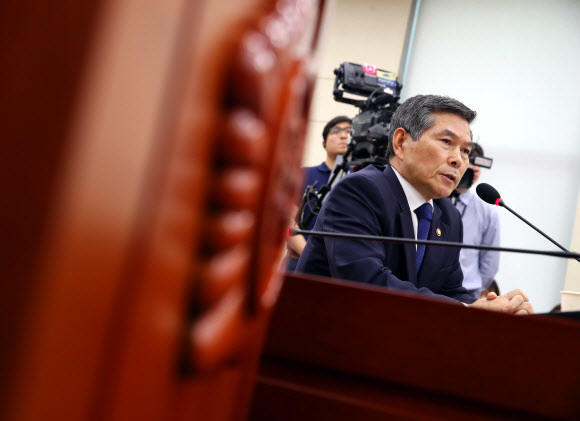 |
|
South Korean Minister of National Defense Jeong Kyeong-doo responds to questions during a full session of the National Assembly’s National Defense Committee on Aug. 5. (Yonhap News)
|
Defense minister admits to providing information on N. Korean missile launches
On Aug. 2, the very day that Japan decided to drop South Korea from its “white list” of countries that are granted an expedited screening process in the export of strategic materials, South Korea shared with Japan intelligence about North Korea’s launch of short-range projectiles according to the two countries’ information-sharing agreement, South Korean Minister of National Defense Jeong Kyeong-doo admitted. In effect, sensitive military information was shared on the same day that the Blue House criticized Japan’s decision and said it would consider withdrawing from the General Security of Military Information Agreement (GSOMIA). “From the time that GSOMIA took effect until now, there have been 26 instances of intelligence sharing,” Jeong said during a full session of the National Assembly’s National Defense Committee on Monday. “We also shared information about the short-range projectiles launched by North Korea on Aug. 2 at Japan’s request.” The South Korean Ministry of National Defense (MND) has shared information about North Korean projectiles with Japan on a total of four occasions since May, and Jeong’s remarks indicate that one of these occasions was the short-range projectiles launched from Yonghung, in South Hamgyong Province, on Aug. 2. Rep. Kim Jong-dae, a lawmaker with the Justice Party, responded as follows: “That was the day that Japan decided to remove South Korea from its white list, having concluded that we’re not a trustworthy country when it comes to security. In light of that, was it appropriate for the Defense Ministry to agree to Japan’s request for military information?” “Japan’s two-faced attitude of removing South Korea from the white list and then asking for intelligence is problematic enough, but on top of that, I’m not sure how to take the Defense Ministry’s agreement to that request.” Bareunmirae Party lawmaker Rep. Ha Tae-gyeong countered by praising the MND for the “mature attitude” it had exhibited in sharing information in line with GSOMIA. “Under any circumstances, the question of security is one that must receive our final consideration,” the lawmaker said. Rep. Ha also hinted that he hopes the MND will resist the proposed withdrawal from GSOMIA. “The Blue House and the Foreign Ministry are talking about scrapping GSOMIA, but the Defense Ministry appears to be quietly opposed to that,” he said. It’s not certain whether the MND fielded Japan’s request for sharing intelligence before or after the Japanese cabinet’s decision about the white list. But even if the intelligence was shared first, the MND’s decision is under fire for being tone-deaf at a time when the South Korean government was doing everything in its power to block the removal. The terms of GSOMIA state that South Korea can decline a Japanese request for sharing information. By Yoo Kang-moon, senior staff writer Please direct comments or questions to [english@hani.co.kr]






